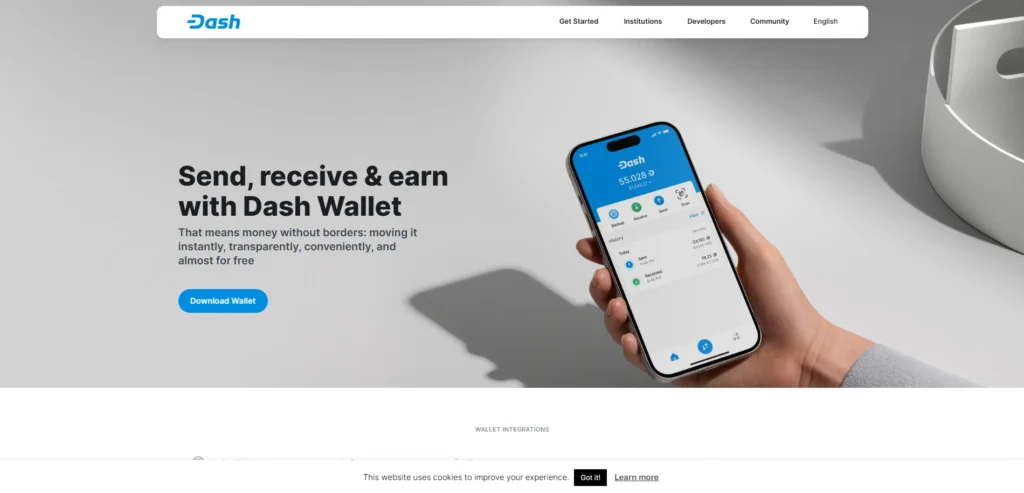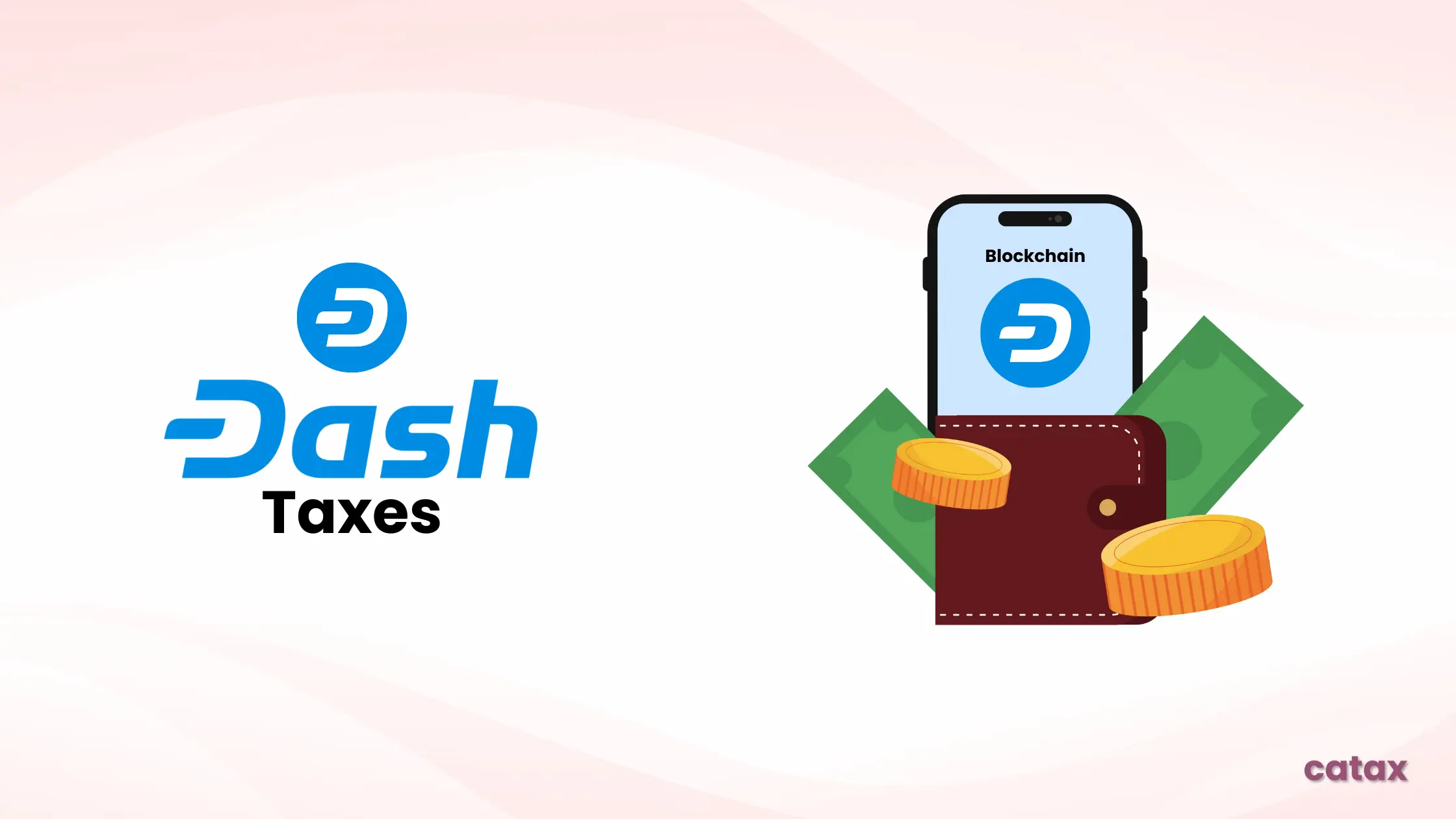Cryptocurrency tax laws vary across countries, and Dash (DASH) transactions may be subject to taxation based on local regulations. Whether you’re buying, selling, trading, or staking DASH, understanding how tax authorities classify these activities is crucial.
This guide simplifies everything you need to know about Dash taxes.

- How to Connect Your Dash Wallet to Catax
- Are Dash (DASH) Transactions Taxable?
- Can You Deduct Trading Fees and Other Costs?
- How Is Dash (DASH) Taxed Based on Holding Period?
- How to Handle Dash (DASH) Losses for Tax Benefits?
- Is Dash (DASH) Mining and Staking Taxable?
- How to Stay Compliant with Dash (DASH) Tax Regulations?
How to Connect Your Dash Wallet to Catax
To track your Dash (DASH) transactions and calculate taxes easily, follow these steps to connect your wallet to Catax:
- Open your Dash wallet or block explorer (such as Trust Wallet, Ledger, MetaMask, or any other supported wallet).
- Copy your public wallet address.
On Catax:
- Log in to catax.app and select your country.
- Select Chain and search for Dash Wallet.
- Paste your public address and click Connect.
Once connected, Catax will automatically track your DASH transactions and simplify tax calculations.
Calculate My Taxes ➤Are Dash (DASH) Transactions Taxable?
Yes, in most countries, Dash transactions are taxable. Governments classify DASH as a capital asset, property, or income, depending on how it is used.
Taxable Dash Transactions
- Selling DASH for a profit – If you sell Dash for more than you paid, the profit is subject to capital gains tax.
- Trading DASH for another cryptocurrency – If you exchange DASH for Bitcoin, Ethereum, or another crypto, this may be a taxable event.
- Using DASH to buy goods or services – Spending DASH can trigger capital gains tax if its value has increased since you bought it.
- Earning DASH from mining or staking – Some countries treat mining and staking rewards as taxable income when received.
- Receiving DASH as payment – If you are paid in Dash for services or work, it is typically considered taxable income based on its market value at the time.
Since crypto tax laws vary worldwide, it’s important to check how Dash transactions are taxed in your country.
Can You Deduct Trading Fees and Other Costs?
Many Dash traders wonder if they can deduct trading fees, transaction fees, and security costs from their taxable income. The answer depends on local tax laws.
Some countries allow deductions for:
- Exchange trading fees paid when buying or selling DASH.
- Transaction (miner) fees paid for sending DASH.
- Security and custody expenses (e.g., hardware wallets, private key storage, multi-signature protection).
Other countries only allow deductions for:
- The cost of acquiring Dash, meaning you can subtract the purchase price from the selling price but not additional expenses.
- To avoid mistakes, review your local tax laws before filing your return.
How Is Dash (DASH) Taxed Based on Holding Period?
The tax rate on Dash profits may depend on how long you hold DASH before selling it. Here’s how it works in most countries:
- Short-term holdings (less than a year) – Many countries tax short-term DASH gains at higher rates, similar to income tax.
- Long-term holdings (more than a year) – Some countries offer lower tax rates on long-term DASH holdings to encourage investment.
- Flat tax rates – Certain jurisdictions apply a fixed tax rate on all crypto gains, regardless of the holding period.
Knowing how your country taxes short-term vs. long-term holdings can help you make better financial decisions.
You can also check out our Country-Specific Guide for Crypto your country. This guide provides insights on regulations, tax implications, and compliance measures breifly explained for each country.
How to Handle Dash (DASH) Losses for Tax Benefits?
Not every Dash trade results in a profit, and selling DASH at a loss may help lower your taxable income. Here’s how some countries handle crypto losses:
- Loss offsets – Some countries allow you to subtract DASH losses from taxable profits, meaning you only pay taxes on net gains.
- Loss carryforward – If you don’t have enough gains in the same tax year, some countries let you carry forward losses to offset future profits.
- Limited deductions – Some jurisdictions do not allow crypto loss deductions at all.
Keeping detailed transaction records will help you report losses accurately and maximize any available tax benefits.
Is Dash (DASH) Mining and Staking Taxable?
If you mine or stake Dash, how it is taxed depends on your country’s regulations.
- Some countries tax mining and staking rewards as income when received, based on the DASH market value at the time.
- If you hold mined or staked DASH and later sell it, you may owe capital gains tax on any profit.
- In some jurisdictions, miners and stakers can deduct expenses such as electricity, hardware costs, and operational fees if mining or staking is considered a business activity.
If you mine or stake Dash, check your country’s specific tax rules to stay compliant.
How to Stay Compliant with Dash (DASH) Tax Regulations?
Governments are tightening crypto tax laws, making compliance more important than ever. To avoid penalties:
- Know how your country taxes Dash transactions – Whether as capital gains, income, or business revenue.
- Check if you can deduct trading fees, mining expenses, and other costs – Different countries have different rules on deductions.
- Maintain accurate records of every Dash (DASH) transaction – This includes buying, selling, trading, mining, and spending DASH.
- Use a crypto tax tool like Catax – Catax helps automate tax calculations, reducing the risk of errors.
- Consult a tax professional if needed – If you’re unsure about tax obligations, seeking expert advice can help you stay compliant with local laws.


